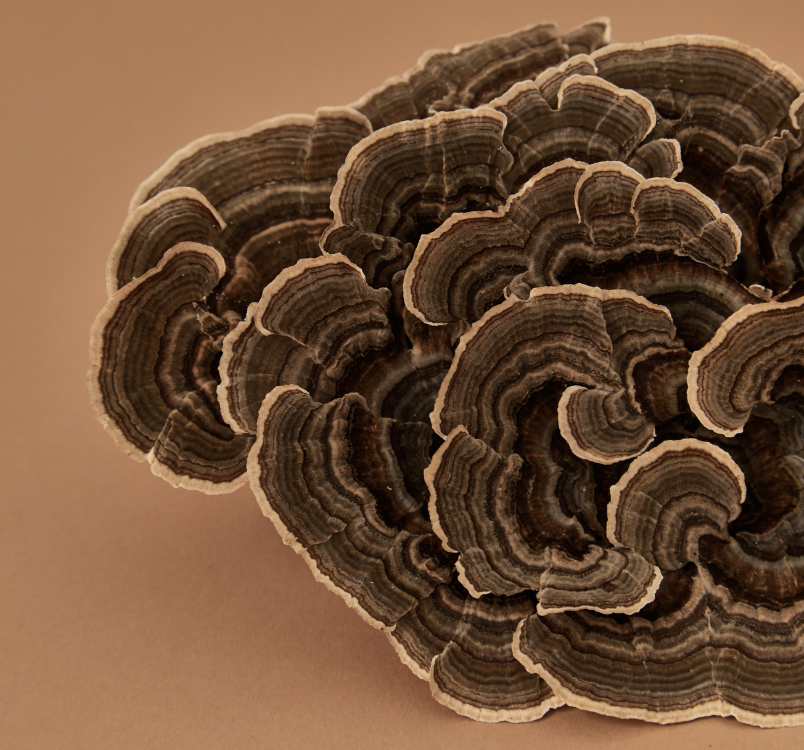Lion’s Mane is the #1 nootropic mushroom for cognitive performance. Traditionally used in Chinese medicine to support memory, focus, and nerve health, this revered tonic herb has found its place in modern wellness circles - from biohackers to deep traditionalists. With increasing research into its neural benefits, Lion’s Mane offers a beautiful bridge between ancient herbal wisdom and contemporary brain support.
What is Lion’s Mane?
Lion’s Mane (Hericium erinaceus), known for its cascading, coral-like appearance, has been used in traditional Chinese medicine for centuries.
In modern times, Lion’s Mane has gained global attention as a natural nootropic: a substance that supports focus, memory, and overall cognitive performance. The mushroom’s unique compounds, such as hericenones and erinacines, have been shown in laboratory settings to influence nerve growth factor (NGF) production - a key player in brain and nerve health.*
Often found on decaying hardwoods in Asia, it was historically treasured for systemic support in Chinese medicine for clarity and vitality.
Top 3 Benefits of Lion’s Mane
Lion’s Mane has long been revered in traditional Chinese medicine as a tonic herb for the brain and nervous system. Today, it continues to attract attention in modern research circles for its potential to support mental clarity, memory, and neural function. While the majority of scientific studies remain preclinical, they offer intriguing insights into how this ancient nootropic mushroom may influence key biological pathways related to cognition and nerve health.
1. COGNITION + MENTAL CLARITY
Traditionally used to sharpen the mind and enhance memory, Lion’s Mane has earned its place as a foundational nootropic herb. Its contemporary appeal stems from emerging evidence suggesting that compounds within the mushroom - such as hericenones and erinacines - may stimulate the production of Nerve Growth Factor (NGF), a protein involved in the development and maintenance of healthy neurons (Kawagishi et al., 2008).
In laboratory and animal models, extracts of Lion’s Mane have been shown to influence NGF activity and neurite outgrowth (Mori et al., 2008). These processes are essential for learning, memory consolidation, and overall brain plasticity. While further human research is needed, early findings hint at Lion’s Mane’s capacity to support cognitive performance, particularly under conditions of stress or ageing.
The traditional view supports this understanding: by tonifying the Spleen and Stomach - organs associated with clarity and thought in Chinese medicine - Lion’s Mane helps foster a centred, focused state of mind.
2. MEMORY + NEURAL VITALITY
One of Lion’s Mane’s most compelling features is its traditional and observed role in supporting memory and neural repair. Historically, it was used to strengthen the “sea of marrow,” a classical term referring to the brain and spinal cord. This aligns with current interest in the mushroom’s potential to support long-term brain health.
In a range of non-clinical studies, Lion’s Mane extracts have demonstrated actions that may encourage nerve regeneration, protect neural tissue, and modulate oxidative stress in the brain (Wong et al., 2021). Researchers have also observed improvements in spatial and recognition memory in animal models following supplementation (Zhang et al., 2016).
While these outcomes do not constitute medical claims, they do reflect the reverence held for this mushroom in both traditional and modern frameworks - as a daily tonic to support memory and protect the vitality of the nervous system over time.
3. NERVE HEALTH + LONGEVITY
Lion’s Mane has historically been used to support the structure and function of the nervous system. In traditional Chinese medicine, this includes strengthening Qi in the digestive system, calming the spirit, and nourishing the roots of vitality that underpin long-term resilience.
Recent investigations have looked into Lion’s Mane’s effects on peripheral nerve health, noting its influence on myelination and axonal regrowth in various non-human models (Wong et al., 2021). These studies suggest a potential for this mushroom to support the body’s natural processes of nerve maintenance and repair - especially when taken consistently over time.
In the SuperFeast tonic tradition, Lion’s Mane is valued as a long-game herb. Its effects accumulate gradually, supporting foundational systems such as cognition, neural clarity, and digestive vitality - all of which contribute to overall mental sharpness and wellbeing.
How to Use SuperFeast Lion’s Mane
Start small: 1/4 teaspoon is a great beginning. Work your way up to a full heaped teaspoon daily, as desired. Lion’s Mane can be added to hot or cold drinks and foods - it’s fully extracted and temperature stable.
Try it in:
- Your morning coffee or matcha (for a nootropic kick)
- Soups, curries, or broths
- Smoothies or protein bowls
Taste profile: Think honeycomb, burnt butter, and toasted wood chips.
Why SuperFeast Lion’s Mane?
Our Lion’s Mane is:
- 100% 10:1 full-spectrum extract
- Grown in the wild mountains of Zhejiang and Heilongjiang, China
- Dì Dào (地道) sourced and grown on wild oak
- 100% fruiting body (no mycelium, no grain)
- Non-standardised and full-spectrum
It’s our way of honouring tradition while delivering quality that meets the needs of the modern brain.
A Final Word
Lion’s Mane is a rare gem in the world of tonic herbs: a mushroom that bridges clarity of mind with depth of tradition. Whether you're seeking sharper recall, creative flow, or steady nerve support - this revered nootropic herb invites you into a more focused, aligned state of being.
Note: All references to research have been framed for educational purposes and do not constitute therapeutic claims.
References:
- Kawagishi, H. et al. (2008). Nerve growth factor-inducing activity of Hericium erinaceus in 1321N1 human astrocytoma cells.
- Mori, K. et al. (2008). Stimulating effects of Hericium erinaceus on nerve growth factor (NGF) synthesis in vitro and in vivo.
- Zhang, Z. et al. (2016). Effects of Hericium erinaceus on recognition memory and neurotrophic factors in aged mice.
- Wong, K.H. et al. (2021). Neurotrophic and neuroprotective effects of Hericium erinaceus mycelium and its active compounds: A review.


